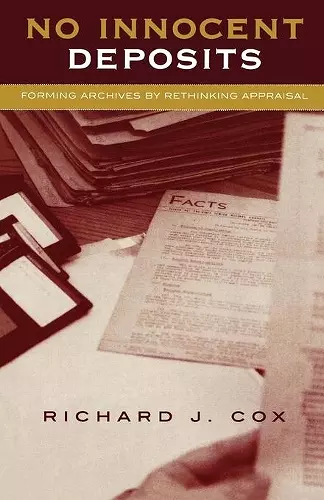No Innocent Deposits
Forming Archives by Rethinking Appraisal
Format:Paperback
Publisher:Scarecrow Press
Published:10th Dec '03
Currently unavailable, and unfortunately no date known when it will be back

Richard Cox's No Innocent Deposits delves into the complexities of archival practices, highlighting how collections are actively shaped by various influences.
In No Innocent Deposits, Richard Cox explores the intricate processes behind the creation and curation of archival collections. He emphasizes that archives are not merely passive repositories of documents; rather, they are actively shaped by the decisions of archivists, record creators, and various institutions. This perspective challenges the common misconception that archives simply exist as untouched historical artifacts. Instead, Cox argues that the formation of archives is a deliberate and often complex process that reflects the values and biases of those who curate them.
Cox's work serves as a critical resource for archivists, historians, and anyone engaged with archival materials. By providing insights into the fundamentals of appraisal, he encourages a deeper appreciation for the collections that are frequently overlooked. The essays in No Innocent Deposits invite readers to consider the implications of how records are selected, preserved, and made accessible, fostering a greater understanding of the archival landscape.
Ultimately, No Innocent Deposits sheds light on the vital role that archivists play in shaping our understanding of the past. Cox's examination of archival practices not only informs professionals in the field but also enriches the experience of historians and the general public who engage with archival materials. Through thoughtful analysis, he advocates for a more nuanced appreciation of archives as dynamic entities that reflect societal values and historical narratives.
...this volume contains rich examples of the various kinds of archival practices, dubious decisions, inadequate methods, and limited professional assumptions about the function of records in society. It is also replete with wide-ranging ideas taken from the literature on museums, libraries, and other memory institutions. Thus, this work references a vast array of fascinating studies and perspectives on 'collecting' from both within the archival profession and from institutions in other parts of the heritage sector....Cox makes some telling points about the importance, indeed, the urgency of appraisal. Cox is virtually unmatched in the sheer mass of information he collects and proffers to archivists through his published studies. He brings to his writing aseemingly inexhaustible storehouse of knowledge of instructive cases, histories, news, and stories about record keeping practice and the strategies and conventions of such preservation bodies as libraries, museums, and other memory institutions. A readerneed only glance at the footnotes and bibliographies in his numerous publications to appreciate wide reading. (When does he take time to sleep?) Indeed, Cox is a relentless documenter and an unabashed empiricist....No one has done more to educate America * Journal of Archival Organization *
As we have come to expect from this author, the book is loaded with examples drawn from everyday life, which illuminate the connection between records and things society thinks (or should think) worth striving for. Some of these connections are profoundly enlightening, linking public issues with appraisal successes and failures in ways that are truly insightful for professional and lay person alike. This has always been one of Cox's strengths. Earlier case studies are repeated here, but this provides a valuable consolidation and exposes new cases...There is much here that is new, stimulating, challenging and profound. The chapters are based on a coherent position and illuminated by wide reading and considered judgments... * Journal Of The Society Of Archivists *
...this volume contains rich examples of the various kinds of archival practices, dubious decisions, inadequate methods, and limited professional assumptions about the function of records in society. It is also replete with wide-ranging ideas taken from the literature on museums, libraries, and other memory institutions. Thus, this work references a vast array of fascinating studies and perspectives on 'collecting' from both within the archival profession and from institutions in other parts of the heritage sector....Cox makes some telling points about the importance, indeed, the urgency of appraisal. Cox is virtually unmatched in the sheer mass of information he collects and proffers to archivists through his published studies. He brings to his writing a seemingly inexhaustible storehouse of knowledge of instructive cases, histories, news, and stories about record keeping practice and the strategies and conventions of such preservation bodies as libraries, museums, and other memory institutions. A reader need only glance at the footnotes and bibliographies in his numerous publications to appreciate wide reading. (When does he take time to sleep?) Indeed, Cox is a relentless documenter and an unabashed empiricist....No one has done more to educate American archivists about the history, practices, and institutional patterns of their own profession than Richard Cox. Few have done more to promote and explain to the outside world the unique value of archives and the challenges archivists face in accomplishing their mission. No one has been a more persistent advocate, critic, and publicist for the profession....those who are unfamiliar with Cox's previous contributions to the field as well as those who wish to learn about what matters have been preoccupying archival scholarship over the last decade will get a good sampling from these essays. * Journal of Archival Organization *
- Winner of Winner of the Waldo Gifford Leland Award for writing of superior excellence and usefulness in the field of archival history, theory, or practice_Society of American Archivists 2005.
ISBN: 9780810848962
Dimensions: 222mm x 141mm x 19mm
Weight: 404g
304 pages